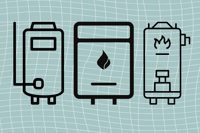
(Via Canva)
This opinion was originally published at The Latino Newsletter.
Editor’s Note: The following opinion piece by Isella is part of the op-ed program from the Latina Futures 2050 Lab.
In the fall of 2016, my husband and I drove across the Washington Bridge into Manhattan for an appointment with my then OB-GYN to confirm what a home pregnancy test had declared a few weeks prior.
I stepped into the elevator with giddy excitement. I had always wanted to be a mother and felt lucky that it was finally my time.
The elevator door opened to a waiting room filled with a diverse group of expecting parents. I checked in, sat down and before I could even pull out my phone to pass the time, I heard my name.
A nurse led us to a room. As my uterus appeared on the screen next to me, I saw what looked like a small seed inside a bigger pouch. The image on the screen was motionless.
I can still hear the silence that filled the room. A kind of shadow fell over the doctor’s face as our eyes met. There was no heartbeat.
Instantly, my eyes were overflowing with tears. I felt my husband’s grip on my hand as I buried my face in his shoulder and sobbed. They sent us to another exam room to double-confirm and to schedule a follow-up procedure.
The days following that unforgettable doctor’s visit, I mostly stayed in bed, rotating between sleep and tears. Two weeks later, we crossed the Hudson River again for a medical procedure called a Dilation and Curettage (D&C) to remove the remains of my nonviable pregnancy.
Once prepped, I sat alone in a hospital gown inside a cold room and wondered if it was my fault. Was this my pecado (sin) showing its face? Years earlier, as a graduate student at UCLA, I opted to terminate an unwanted pregnancy. Was I being punished for choosing myself and not motherhood the first time I got pregnant? I knew it was an unfair and illogical question, but my Mexican Catholic upbringing was present with me in that lonely surgery prep room.
I was not ready for motherhood during the first quarter of my Master’s program. In retrospect, I feel so grateful for the emotional maturity that enabled me to sit through the initial panic and trust in my instinct about the right choice for me.
But the guilt I felt after my miscarriage was real, and it was rooted in Catholic Church notions of motherly holiness embedded in Mexican culture as a result of Spanish colonization. My mom, my grandmother and my aunts urged me and my cousins to align with the eternal self-sacrificing Mexican mother, la Virgen de Guadalupe. Well before I understood the concept of reproductive justice, I was taught all about the selfish and sinful act of abortion.
At home, at church and on TV, the message had always been that abortion was not what good Mexican girls did. The cautionary tales always portrayed the pregnant individual as the selfish villain, and the embryo as the innocent victim. Nobody seemed concerned about the wife who couldn’t manage to feed and care for yet another kid in a home with little to no support from her husband or anyone else. Even in the case of a pregnancy resulting from rape, abortion was still considered a selfish act.
Alone in that room with centuries-old imposed guilt, I leaned on memories of educators who used Chicana feminist theory readings and thoughtful classroom discussions to support the development of my own critical thinking. During my undergraduate years, I studied the history of colonization in Latin America. The devastating genocide suffered by diverse Indigenous nations drove me away from Catholicism. I remembered the disdain I felt for the crimes of the Catholic Church. It helped reassure me that my choice to attain a graduate degree instead of yielding to premature motherhood was not a pecado at all, but rather, my right to claim bodily and life autonomy.
Recovering from the D&C procedure was relatively easy on my body, but the heartbreak of what could have been a wanted baby took longer to heal. The unwavering support and love from my husband and the calls, letters and text messages from my girlfriends helped my recovery.
Still, the guilt showed up again during a chat with my mom two years later, while she visited me in New Jersey. She was helping to care for me and my newborn twins. One afternoon, she shared how proud she was of her best friend for joining a protest outside of a Planned Parenthood. A chill traveled from my stomach up through my spinal cord and settled in my neck. I expressed my deep disagreement with the hateful crowds because they create an unsafe environment for anyone and everyone seeking reproductive healthcare. I expressed my support for a woman’s choice, but I didn’t have words to share my own experiences with her. I was afraid she would be disappointed in me.
I am not sure if my mom can forgive me for my choices. I do not hold it against her. She is a devout Catholic who was raised in Mexico. I am her Chicana daughter, who has charted my own path. It has taken time, but I have been able to let go of the Catholic guilt.
I can say firmly that I do not regret the abortion in my 20s. I am grateful that I experienced a safe and supportive abortion process. These days, I wonder if the ease of my post-miscarriage surgical procedure in December of 2016, a month before the first Trump Administration took office, would have been so following Inauguration Day. Probably not. And today, access to safe and comprehensive reproductive health care is even more threatened than ever. Not only have women lost the federal right to choose with the overturning of Roe v. Wade, but Trump has also cut tens of millions of dollars from Planned Parenthood clinics. These cuts hit places where people most rely on free to low-cost reproductive health services.
The choice to be or not to be a mother is precious and deeply personal, and we must guard it. People making the difficult decision to terminate an unwanted pregnancy should be embraced with support and understanding, not hate and violence. For some women, the assault on our autonomy is made all the more painful by inherited guilt and self-blame.
But we can unlearn all of that.
We can remember that our bodies are our own. We can affirm each other’s choices and recall that we are not alone.











(0) comments
Welcome to the discussion.
Log In
Keep it Clean. Please avoid obscene, vulgar, lewd, racist or sexually-oriented language.
PLEASE TURN OFF YOUR CAPS LOCK.
Don't Threaten. Threats of harming another person will not be tolerated.
Be Truthful. Don't knowingly lie about anyone or anything.
Be Nice. No racism, sexism or any sort of -ism that is degrading to another person.
Be Proactive. Use the 'Report' link on each comment to let us know of abusive posts.
Share with Us. We'd love to hear eyewitness accounts, the history behind an article.